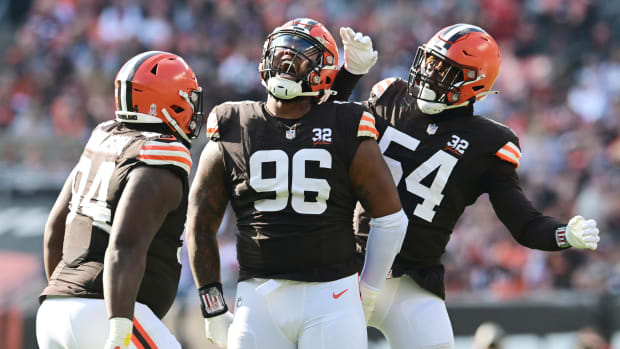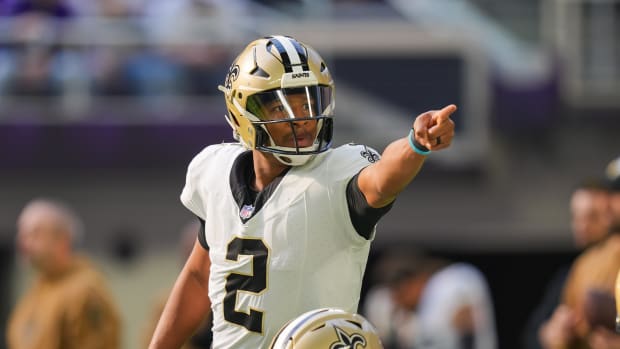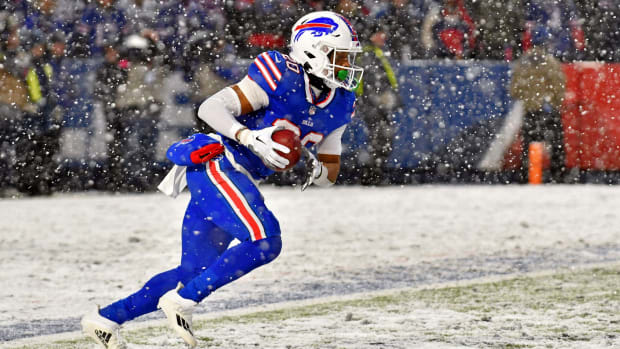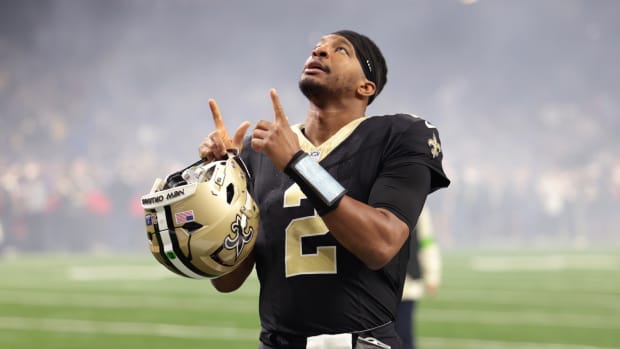Colin Kaepernick Took A Knee So George Floyd Wouldn't
Everything Colin Kaepernick took a knee for has been on display in Minneapolis the last several days.
A 46-year-old black man named George Floyd was in handcuffs, on the ground, unable to move, choked to death under the knee of a police officer named Derek Chauvin. All of it was on camera and it still took days and massive public pressure for Chauvin, who snuffed the life out of Floyd for all the world to see, to even be arrested. Chauvin and three other officers were fired almost immediately after the events went public. It's unclear whether the officers who stood by and watched as a man was killed face down in the street will face any legal ramifications. Kaepernick sought to help people understand this is life for so many people of color in America, many of the players people revere on Sundays.
After consulting Nate Boyer, an NFL player and former Green Beret, who is white, Kaepernick simply took a knee during the 2016 NFL season. He did so quietly, as no one noticed for multiple weeks. He didn't say anything. It wasn't until he was finally asked that Kaepernick spoke out about civil rights, raising the issue of mistreatment of black people by police in the United States. And while many wanted to shut him down before even considering what he was saying, the NFL saw Kaepernick as a threat.
Kaepernick was a threat not for what he was saying, but for what he was doing. He was taking control, and the NFL was powerless to stop him in the moment. They had no way of knowing what he would say. Powerless, an uncomfortable state for the NFL owners who have rarely experienced anything resembling true discomfort, they took steps to regain that power by effectively blackballing Kaepernick. And in so doing so, they sent a message to every other player who might be the next Kaepernick of what would happen, what steps they could take.
The message didn't matter. A player, a black quarterback, was speaking out and seizing control of a league worth billions. Owners, who feel power is their earned right, refused to allow Kaepernick to supersede them, even if he was correct in what he was saying. And he was right. But so many people didn't want to listen. They didn't want to be human and hear the reality that so many of the gladiators they watch battle on Sundays have lived with their entire lives.
The NFL's approach often resembles a significant portion of the United States. NIMBY: not in my backyard. Sure, Kaepernick can speak out, but not while he's wearing an NFL uniform and being filmed by cameras that are supposed to be for their game. So many are comfortable with “them” speaking up for themselves, so long as they don't have to see it. Or think. Or feel.
Kaepernick was politicized and weaponized, told loudly by critics that he could protest, but not during the national anthem, that quietly kneeling during a song shoehorned into sporting events was offensive to those who fought under that banner, despite one of those soldiers telling him to do it this way with any number of others supporting Kaepernick's right to speak.
But they said Kaepernick shouldn't protest at work either. He should do it on his own time, where people could listen to what he was saying at their leisure. In other words, so they didn't have to suffer through the unbearable act of listening to someone offer a perspective of life in America many don't understand. Making people uncomfortable was the point.
Having the industry of football interrupted for a few minutes for the sake of civil rights, a topic that shouldn't be controversial or divisive, was too much to bear. Kaepernick was kneeling for all the George Floyds that had already been and those still yet to come. And he was shunned for it.
Now, as Minneapolis finds itself in chaos, riots ensuing and buildings burning as people who tried to speak out found no other recourse but to force people to pay attention to them. The National Guard is on the scene, trying to take back control and restore order while simultaneously resembling the oppression these people have dealt with for their entire lives. Many of the same people who didn't want to listen to Kaepernick then are unable to reconcile how this could happen as they couldn't understand the riots in Ferguson, Missouri, in 2014 after the death of Michael Brown.
All the same factors were at play. Police corruption, institutionalized racism and oppressed people who found themselves without representation and ignored. They found a way to make people see them and make people listen.
Kaepernick took a knee in 2016. He found a way to make people listen without rioting, without doing any damage to property. And what he received for it was scorn. People assumed they knew his reality better than he did, that he was wrong and should shut up and go away so they could have their football.
And since then, Kaepernick has been accused of being a con, a fake, that it was all about his own glorification as opposed to the issues. And now Kaepernick, quietly and peaceful as ever, is offering to pay for lawyers for those who are protesting in Minneapolis. Kaepernick was right in 2016 and is right now. Maybe, finally, people are ready to listen to him and others speaking from his perspective to help ensure these type of events don't happen for a marginalized population in America.
The NFL, as arguably the most powerful and influential sports league in the world, which employs so many of the people impacted by these issues, should finally make the decision to take on the responsibility of leading when it comes to civil rights and social justice.




